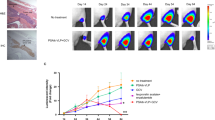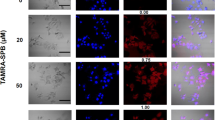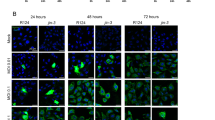Abstract
To explore the potential use of prothymosin α(ProT), a putative thymic hormone, in gene therapy for bladder cancer, we generated a replication-defective recombinant retroviral vector encoding ProT and tested its antitumor effect on the MBT-2 murine bladder cancer. C3H/HeN mice injected with MBT-2 cells in conjunction with retroviruses encoding ProT exhibited smaller tumor mass, lower tumor incidence and higher survival rate, as well as higher antitumor cytotoxic activities compared with those injected with control viruses. However, such effects were not observed in severe combined immunodeficiency mice, suggesting that ProT exerts antitumor effects through its immunomodulatory activities. Cell growth in monolayer culture and colony formation in soft agar were enhanced in ProT gene-modified MBT-2 clones, and such growth-promoting activities of ProT could be reversed if its nuclear localization signal (NLS) was deleted. To circumvent the proliferation-promoting effect of ProT on tumor cells, a retroviral vector encoding ProT lacking NLS was constructed. Our results showed that retroviruses encoding NLS-deleted ProT was more efficacious than those encoding wild-type ProT in prolonging survival of tumor-bearing mice. This is the first report indicating that ProT, in particular NLS-deleted ProT, delivered by retroviral vectors may be further explored for the treatment of bladder cancer.
This is a preview of subscription content, access via your institution
Access options
Subscribe to this journal
Receive 12 print issues and online access
$259.00 per year
only $21.58 per issue
Buy this article
- Purchase on Springer Link
- Instant access to full article PDF
Prices may be subject to local taxes which are calculated during checkout





Similar content being viewed by others
References
Cordero OJ, Maurer HR, Nogueira M . Novel approaches to immunotherapy using thymic peptides Immunol Today 1997 18: 10–13
Haritos AA, Goodall GJ, Horecker BL . Prothymosin α: isolation and properties of the major immunoreactive form of thymosin α1 in rat thymus Proc Natl Acad Sci USA 1984 81: 1008–1011
Haritos AA . Parathymosin α: a peptide from rat tissues with structural homology to prothymosin α Proc Natl Acad Sci USA 1985 82: 1050–1053
Saito S . Immunotherapy of bladder cancer with cytokine gene-modified tumor vaccines Cancer Res 1994 54: 3516–3520
Connor J . Regression of bladder tumors in mice treated with interleukin gene-modified tumor cells J Exp Med 1993 177: 1127–1134
Pineiro A, Cordero OJ, Nogueira M . Fifteen years of prothymosin alpha: contradictory past and new horizons Peptides 2000 21: 1433–1446
Salvati F . Combined treatment with thymosin-α1 and low-dose interferon-α after ifosfamide in non-small cell lung cancer: a phase-II controlled trial Anticancer Res 1996 16: 1001–1004
Heidecke H, Eckert K, Schulze-Forster K, Maurer HR . Prothymosin α1 effects in vitro on chemotaxis, cytotoxicity and oxidative response of neutrophils from melanoma, colorectal and breast tumor patients Int J Immunopharmacol 1997 19: 413–420
Shiau AL . Prothymosin α enhances protective immune responses induced by oral DNA vaccination against pseudorabies delivered by Salmonella choleraesuis Vaccine 2001 19: 3947–3956
Wu CL, Shiau AL, Lin CS . Prothymosin α promotes cell proliferation in NIH3T3 cells Life Sci 1997 61: 2091–2101
Dominguez F . Tissue concentrations of prothymosin α: a novel proliferation index of primary breast cancer Eur J Cancer 1993 29A: 893–897
Magdalena C, Dominguez F, Loidi L, Puente JL . Tumor prothymosin α content, a potential prognostic marker for primary breast cancer Br J Cancer 2000 82: 584–590
Sasaki H . Elevated plasma thymosin-α1 levels in lung cancer patients Eur J Cardiothorac Surg 1997 12: 885–891
Manrow RE, Sburlati AR, Hanover JA, Berger SL . Nuclear targeting of prothymosin α J Biol Chem 1991 266: 3916–3924
Evstafieva AG . Prothymosin α fragmentation in apoptosis FEBS Lett 2000 467: 150–154
Low TL, Goldstein AL . Thymosins: structure, function and therapeutic applications Thymus 1984 6: 27–42
Vareli K . Nuclear distribution of prothymosin α and parathymosin: evidence that prothymosin alpha is associated with RNA synthesis processing and parathymosin with early DNA replication Exp Cell Res 2000 257: 152–161
Morales A, Djeu J, Herberman RB . Immunization by irradiated whole cells or cell extracts against an experimental bladder tumor Invest Urol 1980 17: 310–313
Tzai TS . Effect of perioperative chemoimmunotherapy with cyclophosphamide and autologous tumor vaccine in murine MBT-2 bladder cancer J Urol 1994 151: 1680–1686
Kawabata K . A physiological role of interferon (IFN)-β derived from tumor: tumor growth of a mouse bladder carcinoma line MBT-2 is partially suppressed by autocrine IFN-β Cancer Lett 1997 113: 159–164
Kawabata K . A physiological role of interferon (IFN)-β derived from tumor: tumor growth of a mouse bladder carcinoma line MBT-2 is partially suppressed by autocrine IFN-β
Gilboa E . Immunotherapy of cancer with genetically modified tumor vaccines Semin Oncol 1996 23: 101–107
Shiau AL, Lin CY, Tzai TS, Wu CL . Postoperative immuno-gene therapy of murine bladder tumor by in vivo administration of retroviruses expressing mouse interferon-γ Cancer Gene Ther 2001 8: 73–81
Jhappan C . DNA-PKcs: a T-cell tumor suppressor encoded at the mouse scid locus Nat Genet 1997 17: 483–486
Danos O, Mulligan RC . Safe and efficient generation of recombinant retroviruses with amphotropic and ecotropic host ranges Proc Natl Acad Sci USA 1988 85: 6460–6464
Rayner JR, Gonda TJ . A simple and efficient procedure for generating stable expression libraries by cDNA cloning in a retroviral vector Mol Cell Biol 1994 14: 880–887
Evstafieva AG . Overproduction in Escherichia coli, purification and properties of human prothymosin α Eur J Biochem 231 1995: 639–643
Acknowledgements
We are indebted to Dr TJ Gonda (Hanson Center for Cancer Research, Adelaide, Australia) and Dr RC Mulligan (Whitehead Institute for Biomedical Research, Cambridge, MA,USA) for providing pRUFneo plasmid and retroviral packaging cells, respectively. This work was supported by grants from the National Science Council (NSC87-2312-B006-005 and NSC89-2318-B006-007-M51 to CLW and NSC89-2318-B-006-008-M51 to ALS), Taiwan.
Author information
Authors and Affiliations
Rights and permissions
About this article
Cite this article
Shiau, AL., Lin, PR., Chang, MY. et al. Retrovirus-mediated transfer of prothymosin gene inhibits tumor growth and prolongs survival in murine bladder cancer. Gene Ther 8, 1609–1617 (2001). https://doi.org/10.1038/sj.gt.3301568
Received:
Accepted:
Published:
Issue Date:
DOI: https://doi.org/10.1038/sj.gt.3301568
Keywords
This article is cited by
-
Deletion of Nuclear Localizing Signal Attenuates Proinflammatory Activity of Prothymosin-Alpha and Enhances Its Neuroprotective Effect on Transient Ischemic Stroke
Molecular Neurobiology (2017)
-
Local Immune Stimulation by Intravesical Instillation of Baculovirus to Enable Bladder Cancer Therapy
Scientific Reports (2016)
-
The immunologically active site of prothymosin α is located at the carboxy-terminus of the polypeptide. Evaluation of its in vitro effects in cancer patients
Cancer Immunology, Immunotherapy (2006)



